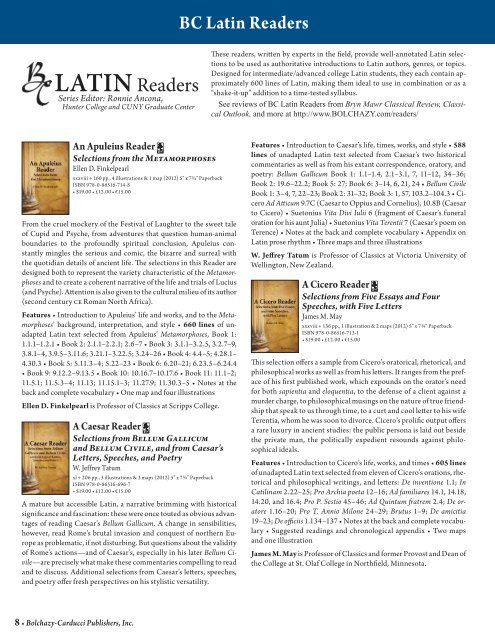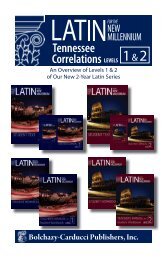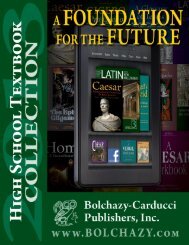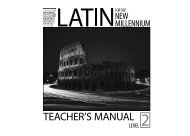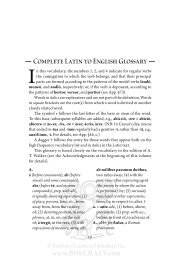College Catalog 2013 - 11-19-12.indd - Bolchazy-Carducci
College Catalog 2013 - 11-19-12.indd - Bolchazy-Carducci
College Catalog 2013 - 11-19-12.indd - Bolchazy-Carducci
You also want an ePaper? Increase the reach of your titles
YUMPU automatically turns print PDFs into web optimized ePapers that Google loves.
BC Latin Readers<br />
Series Editor: Ronnie Ancona,<br />
Hunter <strong>College</strong> and CUNY Graduate Center<br />
These readers, written by experts in the field, provide well-annotated Latin selections<br />
to be used as authoritative introductions to Latin authors, genres, or topics.<br />
Designed for intermediate/advanced college Latin students, they each contain approximately<br />
600 lines of Latin, making them ideal to use in combination or as a<br />
“shake-it-up” addition to a time-tested syllabus.<br />
See reviews of BC Latin Readers from Bryn Mawr Classical Review, Classical<br />
Outlook, and more at http://www.BOLCHAZY.com/readers/<br />
An Apuleius Reader<br />
Selections from the Metamorphoses<br />
Ellen D. Finkelpearl<br />
xxxviii + 160 pp., 4 illustrations & 1 map (2012) 5” x 7¾” Paperback<br />
ISBN 978-0-86516-714-8<br />
• $<strong>19</strong>.00 • £12.00 • €15.00<br />
From the cruel mockery of the Festival of Laughter to the sweet tale<br />
of Cupid and Psyche, from adventures that question human-animal<br />
boundaries to the profoundly spiritual conclusion, Apuleius constantly<br />
mingles the serious and comic, the bizarre and surreal with<br />
the quotidian details of ancient life. The selections in this Reader are<br />
designed both to represent the variety characteristic of the Metamorphoses<br />
and to create a coherent narrative of the life and trials of Lucius<br />
(and Psyche). Attention is also given to the cultural milieu of its author<br />
(second century ce Roman North Africa).<br />
Features • Introduction to Apuleius’ life and works, and to the Metamorphoses’<br />
background, interpretation, and style • 660 lines of unadapted<br />
Latin text selected from Apuleius’ Metamorphoses, Book 1:<br />
1.1.1–1.2.1 • Book 2: 2.1.1–2.2.1; 2.6–7 • Book 3: 3.1.1–3.2.5, 3.2.7–9,<br />
3.8.1–4, 3.9.5–3.<strong>11</strong>.6; 3.21.1–3.22.5; 3.24–26 • Book 4: 4.4–5; 4.28.1–<br />
4.30.3 • Book 5: 5.<strong>11</strong>.3–4; 5.22–23 • Book 6: 6.20–21; 6.23.5–6.24.4<br />
• Book 9: 9.12.2–9.13.5 • Book 10: 10.16.7–10.17.6 • Book <strong>11</strong>: <strong>11</strong>.1–2;<br />
<strong>11</strong>.5.1; <strong>11</strong>.5.3–4; <strong>11</strong>.13; <strong>11</strong>.15.1–3; <strong>11</strong>.27.9; <strong>11</strong>.30.3–5 • Notes at the<br />
back and complete vocabulary • One map and four illustrations<br />
Ellen D. Finkelpearl is Professor of Classics at Scripps <strong>College</strong>.<br />
A Caesar Reader<br />
Selections from Bellum Gallicum<br />
and Bellum Civile, and from Caesar’s<br />
Letters, Speeches, and Poetry<br />
W. Jeffrey Tatum<br />
xl + 206 pp., 3 illustrations & 3 maps (2012) 5” x 7¾” Paperback<br />
ISBN 978-0-86516-696-7<br />
• $<strong>19</strong>.00 • £12.00 • €15.00<br />
A mature but accessible Latin, a narrative brimming with historical<br />
significance and fascination: these were once touted as obvious advantages<br />
of reading Caesar’s Bellum Gallicum. A change in sensibilities,<br />
however, read Rome’s brutal invasion and conquest of northern Europe<br />
as problematic, if not disturbing. But questions about the validity<br />
of Rome’s actions—and of Caesar’s, especially in his later Bellum Civile—are<br />
precisely what make these commentaries compelling to read<br />
and to discuss. Additional selections from Caesar’s letters, speeches,<br />
and poetry offer fresh perspectives on his stylistic versatility.<br />
Features • Introduction to Caesar’s life, times, works, and style • 588<br />
lines of unadapted Latin text selected from Caesar’s two historical<br />
commentaries as well as from his extant correspondence, oratory, and<br />
poetry: Bellum Gallicum Book 1: 1.1–1.4, 2.1–3.1, 7, <strong>11</strong>–12, 34–36;<br />
Book 2: <strong>19</strong>.6–22.2; Book 5: 27; Book 6: 3–14, 6, 21, 24 • Bellum Civile<br />
Book 1: 3–4, 7, 22–23; Book 2: 31–32; Book 3: 1, 57, 103.2–104.3 • Cicero<br />
Ad Atticum 9.7C (Caesar to Oppius and Cornelius), 10.8B (Caesar<br />
to Cicero) • Suetonius Vita Divi Iulii 6 (fragment of Caesar’s funeral<br />
oration for his aunt Julia) • Suetonius Vita Terentii 7 (Caesar’s poem on<br />
Terence) • Notes at the back and complete vocabulary • Appendix on<br />
Latin prose rhythm • Three maps and three illustrations<br />
W. Jeffrey Tatum is Professor of Classics at Victoria University of<br />
Wellington, New Zealand.<br />
A Cicero Reader<br />
Selections from Five Essays and Four<br />
Speeches, with Five Letters<br />
James M. May<br />
xxxviii + 136 pp., 1 illustration & 2 maps (2012) 5” x 7¾” Paperback<br />
ISBN 978-0-86516-713-1<br />
• $<strong>19</strong>.00 • £12.00 • €15.00<br />
This selection offers a sample from Cicero’s oratorical, rhetorical, and<br />
philosophical works as well as from his letters. It ranges from the preface<br />
of his first published work, which expounds on the orator’s need<br />
for both sapientia and eloquentia, to the defense of a client against a<br />
murder charge, to philosophical musings on the nature of true friendship<br />
that speak to us through time, to a curt and cool letter to his wife<br />
Terentia, whom he was soon to divorce. Cicero’s prolific output offers<br />
a rare luxury in ancient studies: the public persona is laid out beside<br />
the private man, the politically expedient resounds against philosophical<br />
ideals.<br />
Features • Introduction to Cicero’s life, works, and times • 605 lines<br />
of unadapted Latin text selected from eleven of Cicero’s orations, rhetorical<br />
and philosophical writings, and letters: De inventione 1.1; In<br />
Catilinam 2.22–25; Pro Archia poeta 12–16; Ad familiares 14.1, 14.18,<br />
14.20, and 16.4; Pro P. Sestio 45–46; Ad Quintum fratrem 2.4; De oratore<br />
1.16–20; Pro T. Annio Milone 24–29; Brutus 1–9; De amicitia<br />
<strong>19</strong>–23; De officiis 1.134–137 • Notes at the back and complete vocabulary<br />
• Suggested readings and chronological appendix • Two maps<br />
and one illustration<br />
James M. May is Professor of Classics and former Provost and Dean of<br />
the <strong>College</strong> at St. Olaf <strong>College</strong> in Northfield, Minnesota.<br />
8 • <strong>Bolchazy</strong>-<strong>Carducci</strong> Publishers, Inc.


